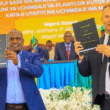A recent report by the Daily News has indicated that, because the National Microfinance Bank (NMB) sees itself as the bank of the people with a duty to invest heavily in the areas which provide additional benefits to the majority of the population, it has promised to increase its support to the Tanzania agriculture sector.
Currently, according to Ben Christiaanse, the NMB Chief Executive Officer (CEO), over 20 percent of the NMB’s loan and advances portfolio is attributed to the agricultural sector.
“We are looking at agriculture as the lead sector and the engine of the country’s economic growth,” said Mr. Christiaanse.
Mr. Christiaanse went on to say that the total assets for the bank have increased by 1 percent, from TZS 1,384,268 million to TZS 1,522,681 million, based on its first quarter reports.
In addition, during the same period customer deposits are reported to have increased from TZS 1,200,484 million to TZS 1,328,311 million.
“We are happy with the results, particularly at this time when many parts of the world are complaining of economic meltdown,” said Mr. Christiaanse, “NMB is doing well.”
According to the bank’s CEO, NMB registered approximately 1,000 new customers every day during the first quarter of 2009 and currently boasts 1.3 million accounts, with an additional 10 branches and at least 100 ATMs expected to be installed and opened this year.
“Our goal is to go closer to the people,” said Mr. Christiaanse, “especially in rural areas where millions of Tanzanians are still unbanked.”
Since the NMB first began offering loans to its customers several years ago, the bank has experienced a trend in growth.
According to the Daily News report, Mr. Christiaanse has said that he was pleased with the current trend, while emphasizing the fact that the bank’s current loan policy followed strict prudential rules and best practices.
“In those few years the loans and advances portfolio has swelled to more than half a trillion shillings,” he said, “This is significant performance.”
Mr. Christiaanse went on to explain that, while currently the bank’s major customers had not yet been seriously affected by the global financial crisis, it was possible that it could soon begin to feel some of the future effects of the crisis.
“The crisis is going to affect everybody,” he said, “Many people have lost jobs, a factor which has adversely affected purchasing power and consumption in the society.”
In order to combat the effects of the global financial crisis, Mustafa Mkulo, the Tanzanian Minister of Finance and Economic Affairs, has requested that the International Monetary Fund (IMF) provide the country with assistance, citing recent declines in receipts from traditional exports and tourism as reasons for the current vulnerable state of the country’s economy.










